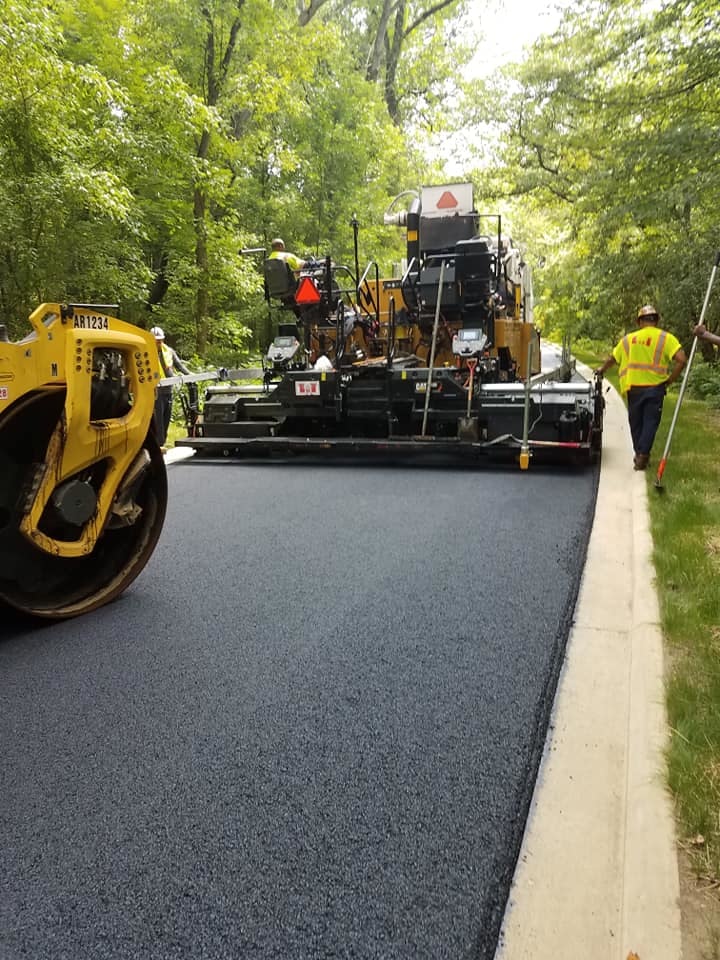Open the Prospective of Angled Parking with Hot Mix Asphalt Paving Solutions
Open the Prospective of Angled Parking with Hot Mix Asphalt Paving Solutions
Blog Article
Checking Out the Environmental Advantages of Hot Mix Asphalt
The use of Warm Mix Asphalt in infrastructure projects offers a compelling case for lasting advancement and ecological stewardship. By diving into the detailed details of its production processes and the cutting-edge use recycled materials, a deeper understanding arises of how this modern technology exceeds simple surface applications. The ecological advantages of Hot Mix Asphalt extend much past first impacts, using a nuanced point of view on how this material can pave the means for a greener future.

Lowered Greenhouse Gas Emissions
The manufacturing procedure of Hot Mix Asphalt includes heating the mix of accumulation and asphalt binder to high temperatures. By integrating reclaimed asphalt sidewalk and recycled asphalt tiles right into the mix, the requirement for virgin materials is lowered, leading to power savings and lowered exhausts linked with removal and handling.
Researches have actually revealed that Warm Mix Asphalt sidewalks have a smaller sized carbon footprint over their life process contrasted to various other pavement options. The toughness and recyclability of Warm Mix Asphalt better boost its ecological benefits by lowering the need for constant upkeep or substitute, thereby saving resources and reducing discharges related to restoration activities.
Power Efficiency and Preservation
The production process of Warm Mix Asphalt not only lowers greenhouse gas discharges but likewise contributes substantially to power effectiveness and preservation efforts. Power efficiency is a crucial benefit of Hot Mix Asphalt manufacturing compared to other pavement types. The procedure involves warming the products at heats to produce the asphalt mix, which calls for much less power than alternate methods. Furthermore, the capacity to recycle and reuse asphalt sidewalk additionally enhances energy conservation. By including reclaimed asphalt pavement (RAP) into new blends, the sector saves power that would certainly have been required to produce totally brand-new materials. The durability of Warm Mix Asphalt minimizes the regularity of maintenance and restoration, leading to long-term power savings. This longevity lessens the energy-intensive processes entailed in frequent fixings and replacements. Generally, Warm Mix Asphalt sticks out as an eco-friendly choice that prioritizes energy performance and conservation throughout its lifecycle.
Sustainable Sidewalk Solutions

One key element of sustainable pavement solutions is the use of recycled materials such as redeemed asphalt pavement (RAP) and recycled asphalt roof shingles (RAS) By integrating these materials right into the asphalt blends, the demand for virgin resources is reduced, leading to reduced energy intake and greenhouse gas discharges during manufacturing. In addition, the reuse of these materials assists draw away waste from land fills, adding to a much more sustainable and round economic situation.
Moreover, lasting pavement options concentrate on optimizing sidewalk style to improve efficiency and durability. Methods such as cozy mix asphalt (WMA) and rock mastic asphalt (SMA) boost the toughness and strength of sidewalks, minimizing the requirement for constant repair services and substitutes. By implementing these ingenious methods, framework programmers can produce sidewalks that not just meet high-performance criteria yet also minimize their environmental impact.
Minimized Environmental Impact
Hot mix asphalt, in specific, offers several benefits that add to minimizing the overall environmental impact of road framework. One crucial facet is the recyclability of asphalt, which can be recycled several times without endangering its high quality - Regrading.
Furthermore, the production of warm mix asphalt produces lower degrees of greenhouse gases contrasted to various other pavement materials, making it a much more environmentally pleasant choice. The power performance of asphalt plants has actually also enhanced over the years, resulting in reduced gas intake and lower discharges. Furthermore, the smooth surface area of warm mix asphalt lowers rolling resistance for automobiles, resulting in reduced fuel consumption and decreased air pollution from car emissions.
Contribution to Climate Adjustment Reduction
Warm mix asphalt plays an important duty in mitigating climate modification with its sustainable buildings and minimized ecological effect. One considerable contribution to climate adjustment mitigation originates from angled parking the energy efficiency of hot mix asphalt manufacturing. Compared to other sidewalk choices, the production process for hot mix asphalt takes in less energy and emits reduced degrees of greenhouse gases, hence decreasing its general carbon footprint.
Additionally, hot mix asphalt's ability to reflect sunlight, understood as albedo, aids in minimizing metropolitan warmth island effects. By decreasing warmth absorption and retention, warm mix asphalt sidewalks can decrease the demand for air conditioning in metropolitan locations, as a result lowering greenhouse gas exhausts connected with power intake for cooling purposes.
Additionally, the toughness and recyclability of warm mix asphalt further improve its climate change mitigation capacities. Regrading. The lengthy lifespan of asphalt pavements minimizes the need for constant fixings or substitutes, inevitably lowering the carbon emissions linked to road maintenance tasks. The recyclability of asphalt materials decreases the demand for virgin resources and decreases the environmental effect of sidewalk building, aligning with lasting practices for environment change reduction.
Conclusion
Finally, the ecological advantages of Hot Mix Asphalt demonstrate its significant contribution to minimizing greenhouse gas exhausts, preserving energy, and reducing ecological influence. This sustainable pavement service lines up with climate change reduction efforts, advertises source preservation, and improves framework development. By utilizing recycled materials, energy-efficient manufacturing processes, and durable layout, Hot Mix Asphalt plays an essential function in cultivating a much more eco pleasant approach to framework building and construction.
The production procedure of Hot Mix Asphalt involves warming the mixture of aggregate and asphalt binder to high temperature levels. By integrating recovered asphalt pavement and recycled asphalt roof shingles right into the mix, the demand for virgin products is minimized, leading to energy savings and reduced exhausts connected with removal and handling.
One secret element of sustainable pavement services is the use of recycled materials such as recovered asphalt sidewalk (RAP) and recycled asphalt tiles (RAS) Strategies such as warm mix asphalt (WMA) and stone mastic asphalt (SMA) boost the resilience and resilience of pavements, reducing the demand for frequent repair services and replacements. Compared to various other sidewalk options, the manufacturing procedure for warm mix asphalt consumes much less power and gives off lower degrees of greenhouse gases, hence minimizing its overall carbon impact.
Report this page